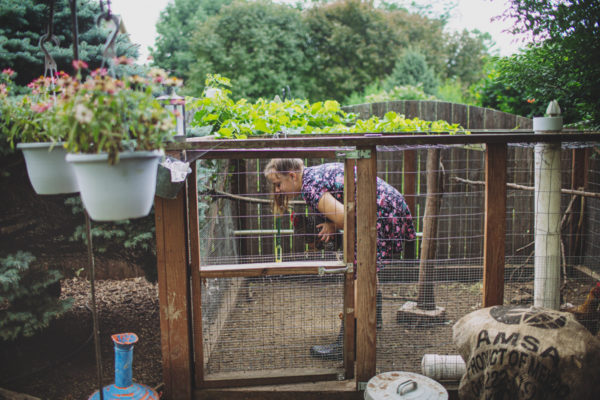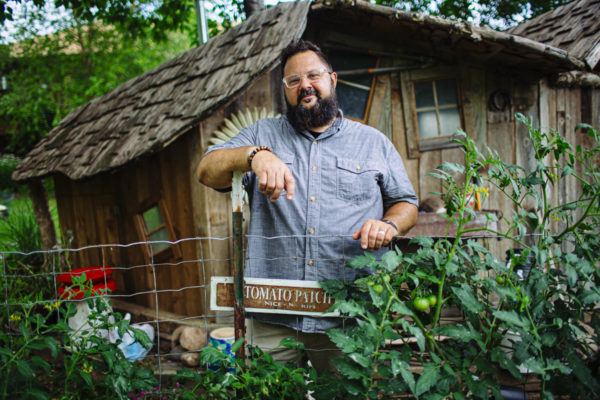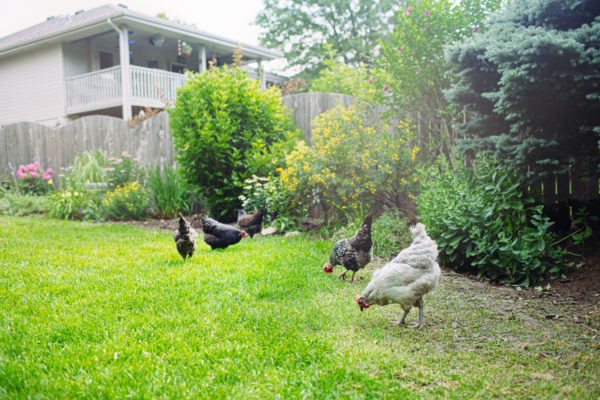It started with three chickens in a store-bought, redwood playhouse. Now the Donscheski family has 20 chickens in a custom-built cedar coop that’s 20 feet by 6 feet and tall enough to stand in, with quirky windows and a brick patio.
Josie Donscheski, at age 7, visited a friend who had chickens, and then begged her dad to get some. When Barry finally agreed to bring chickens to their yard in Millard Park, he did so on the condition that they could live in her playhouse, but it wouldn’t be hers anymore—it would be theirs. He wanted her to understand that decisions like this mean sacrifice.
It was an important lesson for her to learn. Josie, who turns 15 on Sept. 15, has isodicentric chromosome 15 syndrome, or idic(15). This means she has an extra 15th chromosome, which leads to challenges in comprehension and focus. The chickens were one way for her to learn consequences, which helps her focus.
Josie’s mom Patti says it’s like having a teenager and a kindergartner in one. “But really, I have the same concerns as any parent,” Patti says. “I want her to have friends and be happy.”
r r
r
Friends are easy for Josie to find. She is fascinated by bugs—she’ll catch them, talk to them, and sometimes feed them to the chickens.
The sacrifice soon became a passion. The chickens are great playmates for Josie. In 2016, Barry's father Don, and son Kaylor, helped Barry build the custom chicken coop, complete with a flower box. Inside is a roosting bar where Josie plays school with the chickens. She often “teaches” the chickens songs or letters.
About every three months, she’ll talk her parents into having one of the chickens in the house for a sleepover. Patti’s rule is that the selected chicken gets a bath before coming in. Then Barry will help Josie paint the chicken’s “toenails,” and Josie will play a movie on a tablet and tuck in the chicken.
Barry, a landscape designer by trade, has learned patience from his energetic, loquacious daughter. The chickens have also helped. He spends at least an hour a day tending to them and the yard—six to eight hours on weekends.
r r
r
“First and foremost, it’s a job,” Barry says. “Your commitment is...daily. Clean up, food, water, and health needs.”
The Donscheskis’ chickens are set up on an automatic watering system Barry created. When the sprinkler system kicks on, it fills a PVC tube that holds five gallons.
“You’ll need to get a permit from the city to have them,” Barry says. “Your coop will have to be the appropriate size to house the number of chickens you intend on acquiring. Rule of thumb is 4 square feet per bird in the run.”
r
He also advises that owners be conscious of your neighbors. Roosters aren’t allowed within city limits because of their noisiness, but even hens can make a lot of noise when laying. “I try and [give] my neighbors eggs and talk to them about the coop,” Barry says. “If anything negative is mentioned, even in jest, it is taken care of immediately. Flies, smell, and noise are the main concerns.”
The chickens have been a nice addition to this family’s life. Barry and Patti sit and chat while Josie uses her butterfly net to meet new friends. The chickens scatter around the yard.
This article was printed in the September 2019 edition of OmahaHome. To receive the magazine, click here to subscribe.















